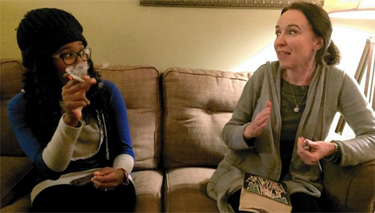By Mark Ellis

Deb Button is a conservative, forty-something soccer mom with two teenage sons who voted against pot legalization in Colorado before she tried marijuana herself.
But after pot was approved by voters in the mile-high state, she began to use the drug to treat her migraine headaches. Then something unusual happened during one of her medicinal treatments.
“One night I got high and had the most incredible spiritual experience of my life,” she said. “I’m sitting in my living room and the cannabis was kicking in at a higher dose, and I could literally feel God. I was filled with love, an indwelling of love,” Button told the L.A. Times.
In her inebriated state, Button hopped on her bicycle and pedaled around her Centennial, Colorado neighborhood.
“I loved everyone I saw. I said, ‘Thank you, God. That was the feeling I always wanted in church!'” she told the L.A. Times.
After her unusual experience, Button placed an ad on Craigslist last May, looking for others who might share her love for marijuana and Jesus in a Bible study format.
She now has more than 30 members meeting weekly at her home or a local coffee shop for the unique study, according to the Times.
On one cold evening, members of the group made themselves comfortable while Button placed a Mason jar full of joints, a lighter, and a stack of Bibles at the center of the group.
Mia Williams and Kim Garcia, both college students, helped themselves to some pot.
“People are very judgmental in many churches,” Williams told the Times as she lit up a joint. “We are not saying this is the only way, but this is the way we worship God.”
Button believes Jesus would approve of their unconventional choice. “Even if Jesus didn’t smoke weed, he’d still be a stoner,” she told the Times. “Jesus was peaceful and loving. He went from house to house and was always accepted,” she explained. “Only a stoner could do that.”
Medical vs. recreational use
Some mainline denominations have approved medicinal marijuana use but won’t accept recreational pot. The United Methodist, Presbyterian and Episcopal churches approve of medical marijuana citing Matthew 25:35, in which Jesus talks about relieving pain and suffering.
Most evangelical churches point to Bible passages instructing believers not to engage in drunkenness, which they maintain includes drugs like marijuana, along with the teaching that the body is a temple of the Holy Spirit and should not be polluted in any form.
While hallucinogenic and narcotic plants have played a role in cultic religious ceremonies for thousands of years, Christianity has disapproved — with the exception of alcohol — which is generally approved in moderation in the Old and New Testaments.
Rejecting such teachings, Button has fully embraced the narcotic, turning her home into a “Bud & Breakfast” where she serves up marijuana-laced pastries and pot leaf smoothies each morning for her guests, according to the Times.
A nervous-looking woman wandered into the Bible study and asked not to be identified over concerns about losing her job. While marijuana is legal in Colorado, employees can still be fired for flunking a drug test.
“I used to cry and beg God to please take this away, but without it I had these deep depressions I couldn’t escape,” the woman told the Times. “When it finally became legalized I just wept and thanked God.”
Scriptural sanction?
Button opened Colossians, Chapter 2, in the New Testament and read it aloud. The passage speaks to the role of dietary restrictions imposed in legalistic religious observances: “Since you died with Christ to the elemental spiritual forces of this world, why, as though you still belonged to the world, do you submit to its rules: ‘Do not handle! Do not taste! Do not touch!’?”
People in the Stoner Jesus Bible Study nodded their heads in approval.
“That was deep,” Williams said.
“What messages resonated with you?” Button asked.
Williams said the chapter showed God “made all of this stuff for you, and you don’t have to listen to what others think.”
Another woman saw the chapter as an allowance for freedom in their lifestyle choice.
“If using marijuana causes people to have a peacefulness that pours into others, how can that be anything but pleasing to Christ?” she asked.
Father Thomas Reese, a senior analyst at the National Catholic Reporter, disagreed with these sentiments. “One of the problems of using drugs in spirituality is you can confuse an emotional high with a spiritual experience, and that can be very dangerous,” Reese told the Times.
“Spirituality is more than being mellow and feeling good about yourself. A spiritual experience is supposed to help you get closer to God. You should become closer with your brothers and sisters and realize your responsibility for loving your neighbor as yourself.”
Button said she’s been called a “witch” and a “blasphemer” for linking pot with Christianity.
Greg Giesbrecht, 57, told the L.A. Times his evangelical church expelled him after leaders in the church found out he used medical marijuana.
“They called and told me I wasn’t welcome,” he said.
He is now in the process of building a 146-acre marijuana-friendly retreat in rural Colorado where people can camp, get married and use marijuana along with their worship — without any backlash.
As the Bible study drew to a close, Button and Williams shared a final drag from their joints.
“If weed were more welcome in church, you would see a spiritual revolution,” Button said.
For the complete story in the L.A. Times, go here



